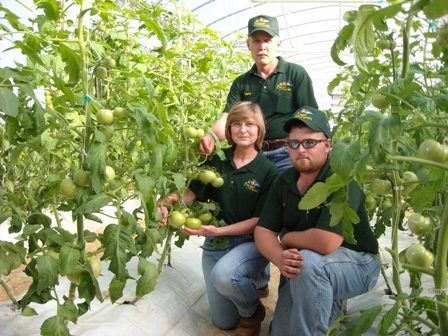Farm Boy

Sunday night I received a photo from Tommy Barbee, showcasing his supper. “Look at what a farm boy can create,” he said. The picture displayed a bright green salad, replete with cucumbers, tomatoes, and more; all of which he had grown there at Barbee Farms.
As a locavore (someone who eats a local diet), this notion of sharing stories about where one’s food came from is the norm.
But this exchange was special. You see, this time last year we weren’t sure Barbee Farms would exist today.
Located just inside the Concord city limits, Barbee Farms is two blocks off I-85. Those who know the area can attest to the development that has emerged over the last ten years; what was once rural countryside is now subdivisions, gas stations, and piles of traffic.
 The development pressures which arise in the rural-urban fringe can easily decimate a farming community. A single farm selling off property for development has multiple impacts. Not only is that farm’s production eliminated, but support for farm-related infrastructure (such as feed stores, butchers, and farm machinists) is diminished.
The development pressures which arise in the rural-urban fringe can easily decimate a farming community. A single farm selling off property for development has multiple impacts. Not only is that farm’s production eliminated, but support for farm-related infrastructure (such as feed stores, butchers, and farm machinists) is diminished.
Meanwhile, development introduces a suburban populace that has little use for such farm-related infrastructure. Instead, suburbanites create demand for retail, driving up the cost of doing business for a sector already suffering the loss of farm-based customers.
When the tipping point is reached and these agribusinesses also close their doors, the farms that had hung on now have to find other infrastructure. Often this becomes cost prohibitive, and now we have another set of farms no longer able to earn enough to stay on the land.
The Barbees have faced this daunting reality. A century farm, in the family for six generations, means the land is more important than money, and the Barbees began working jobs off the farm years ago so they could afford to keep their land despite development pressure.
But the emergence of the local food movement created a glimmer of hope. The Barbees decided to expand their production of fruits and vegetables to meet this new demand. Both Tommy and his son Brent began farming full-time.
The outlook was bright. Farmers’ markets were springing up left and right. The Barbees began selling through Know Your Farms, and even started up their own community supported agriculture program. They got hooked up with the Society of St Andrews (aka the gleaners), and by the end of the summer, had donated tens of thousands of pounds of food to local food banks.
Then one day early last fall, the Barbees received the letter they long feared would come. The NC Department of Transportation wanted to reroute a local access road in anticipation of widening I-85. The projected route would sever the farm in two, separating the tractors, greenhouses, and washing stations from the food in the fields with a 45-mph road.

In an act of faith, Tommy Barbee turned the issue over to his local food community. Many cries and heartfelt protestations arose at the unfairness of it all; no one wanted to see the farm disappear under asphalt. Despite our angst, Tommy asked us to treat the state officials with respect and to encourage a mutually-beneficial solution.
What a letter-writing campaign there was! From fellow farmers to middle-schoolers to college professors, there was quite a range of protest. The most volume, however, arose from the gleaners.
The Society of St Andrews sends crews out into fields to harvest food which the farmers are unable to pick themselves. These gleanings are then taken to charitable organizations for distribution to the food insecure, while the farmer receives a tax credit for his donation. In a single summer, the gleaners had gleaned tens of thousands of pounds of food from the Barbees’ fields. They didn’t want to lose this charitable source, and they knew how to mobilize community.
Hundreds of letters arrived at the DOT project manager’s desk, each gleaner asking kindly for another alternative to be considered. What surprised him most, the project manager later confided, was that not a single letter was from the land owner. In the end, he had to go ask the Barbees to formally submit a written comment on the matter.
At the hearing, which occurred a year ago this week, eighteen people stood up to speak on behalf of Barbee Farms. Little did they know when taking the podium that the decision had already been made. The public outcry had raised awareness that there was, in fact, a vibrant farming operation inside the city limits, lying just beneath the line where a new road would spring forth. No, NC DOT had decided to reroute the road and save the farm.
We later learned that the traffic engineers had been surprised at the impact one farm could have in its community. Recently, an NC DOT official said they are now looking more carefully at farmland preservation concerns when planning road projects.
Yes, it’s especially meaningful when Tommy says to me, “Look what a farm boy can create.”
If you look behind his fields of lettuce, tomatoes, and cucumbers, you can see what six generations of farm boys have helped us create: a place that feeds our community and challenges us to come together with integrity and concern for the greater good.
Just imagine what might happen if we had more farm boys out there.
Christy Shi started Shi-Day Consulting. She can be reached at christy.shi@gmail.com.
Photos by Christy Shi, Map based on NCDOT alignments
Christy Shi